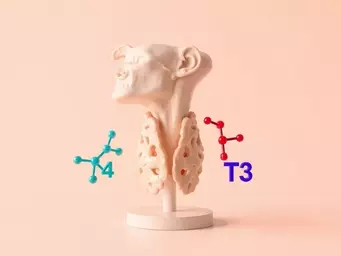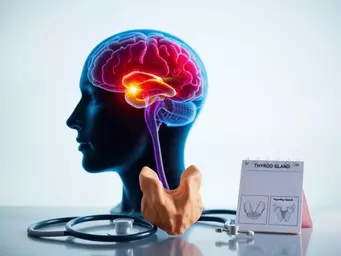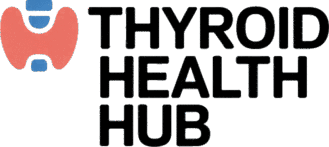Understanding Hypothyroidism Treatment Choices

Have you ever felt unusually fatigued or noticed shifts in your mood without an obvious cause? These could be subtle signs pointing to hypothyroidism, a condition that affects many yet often goes unrecognized. Understanding the nuances of this thyroid disorder can empower you to take control of your health journey.
What You Will Learn
- Hypothyroidism is caused by insufficient hormone production from the thyroid, significantly impacting overall health.
- Recognizing symptoms like fatigue, weight gain, and mood changes is crucial for early diagnosis and treatment.
- Choosing the right treatment is essential; options include T4 therapy, combination T4 and T3 therapy, and natural desiccated thyroid.
- Collaborating with healthcare providers and asking the right questions can lead to a personalized and effective treatment plan.
Hypothyroidism Treatment Options: A Comparative Overview
Understanding the various treatment approaches for hypothyroidism is crucial for effective management. Below is a comparison of common therapies, highlighting their primary characteristics.
T4 Hormone Replacement Therapy (Levothyroxine)
Mechanism: Replaces thyroxine (T4) that the thyroid gland fails to produce.
Benefits: Highly effective for most, normalizes thyroid hormone levels, widely available.
Considerations: Some may not feel optimal on T4 alone, requires consistent daily dosing.
Combination T4 and T3 Therapy
Mechanism: Supplies both T4 (inactive) and T3 (active) thyroid hormones.
Benefits: May improve energy and well-being for those who don't thrive on T4 alone.
Considerations: Requires careful monitoring; T3 can have a shorter half-life.
Natural Desiccated Thyroid (NDT)
Mechanism: Derived from animal thyroid glands, contains T4, T3, T2, and calcitonin.
Benefits: Preferred by those seeking a "holistic" approach, some report better symptom relief.
Considerations: Potency can vary between batches, often requires more frequent monitoring.
Patient-Provider Collaboration
Mechanism: Active engagement between patient and healthcare provider.
Benefits: Ensures personalized treatment, addresses concerns, fosters informed decisions.
Considerations: Requires open communication and shared decision-making.
Understanding Hypothyroidism: The Importance of Treatment Options
Living with hypothyroidism can be challenging, particularly when navigating the myriad of treatment options available. As someone who has dedicated over a decade to thyroid health, I’ve seen firsthand how crucial it is for patients to understand their condition. Hypothyroidism occurs when your thyroid gland doesn't produce enough hormones, leading to various health issues that can affect your overall well-being. For a comprehensive overview of how hypothyroidism impacts the body, you can refer to resources like the National Center for Biotechnology Information (NCBI).
The importance of treatment options lies not just in managing symptoms but in restoring balance to your body. Think of your thyroid as a crucial component in your body's energy management system. When it's underactive, it can lead to fatigue, weight gain, and even mood changes. Understanding your treatment options empowers you to take an active role in your health journey!
What is Hypothyroidism and Its Impact on Health?
At its core, hypothyroidism is a condition that arises when the thyroid gland fails to produce sufficient hormones, particularly thyroxine (T4). This situation can stem from autoimmune diseases, like Hashimoto’s thyroiditis, or other factors such as iodine deficiency or certain medications. The impact on health can be significant, including increased cholesterol levels, weight gain, and depression. Recognizing these signs is the first step towards seeking treatment. Fortunately, treatment options exist that can help restore thyroid function and improve your quality of life. The American Thyroid Association (ATA) offers valuable patient information on this topic.
- Fatigue and weakness
- Weight gain or difficulty losing weight
- Cold intolerance
- Dry skin and hair loss
Recognizing these signs is the first step towards seeking treatment. Fortunately, treatment options exist that can help restore thyroid function and improve your quality of life.
Why is Choosing the Right Hypothyroidism Treatment Crucial?
Choosing the right treatment for hypothyroidism is vital because it directly affects your quality of life. Different treatments work differently for each person, and what may be effective for one individual might not suit another. This is why at Thyroid Health Hub, we emphasize the importance of comprehensive education and personalized care. For detailed guidelines on managing thyroid conditions, you can consult the European Thyroid Association (ETA) guidelines.
- Helps in symptom relief
- Reduces the risk of long-term complications
- Improves overall hormonal balance
By understanding the various treatment options, you can collaborate effectively with your healthcare provider to find the best approach tailored to your unique needs!
Common Symptoms of Hypothyroidism: Recognizing the Signs
It's essential to recognize the common symptoms of hypothyroidism early on. Many individuals go undiagnosed simply because they attribute their feelings to stress or aging. If you find yourself experiencing any of the following, it might be time to consult with a healthcare professional:
- Persistent fatigue
- Weight gain or difficulty losing weight
- Depression or mood swings
- Constipation and digestive issues
- Muscle weakness or joint pain
Understanding your symptoms is a critical step in managing hypothyroidism. At Thyroid Health Hub, I aim to equip you with the knowledge and resources needed to recognize these signs and take action!

We Want to Hear From You!
What do you think about the various treatment options for hypothyroidism? Share your thoughts below:
Summarizing the Path to Effective Hypothyroidism Treatment
In our journey through understanding hypothyroidism, it's essential to highlight key treatment options. Each therapy, whether T4, T3, or natural alternatives, brings unique benefits and challenges. The most crucial takeaway is that the best choice is highly personal and depends on individual health needs and responses.
Here’s a quick summary of the most common treatments for hypothyroidism:
- T4 Hormone Replacement Therapy: Effective for many, primarily using levothyroxine to normalize thyroid hormone levels.
- Combination T4 and T3 Therapy: This approach may enhance energy levels and overall well-being for some patients.
- Natural Desiccated Thyroid (NDT): Preferred by those seeking a more holistic approach to treatment.
Each treatment path requires careful consideration and ongoing dialogue with your healthcare provider. Remember, the goal is to find a plan that not only alleviates symptoms but also fits your lifestyle.
Choosing the Right Hypothyroidism Treatment for Your Needs
Choosing the right treatment for hypothyroidism can feel overwhelming, but it doesn’t have to be! First and foremost, it’s important to recognize that no single treatment works for everyone. Your unique situation should guide your choices. Here are some factors to consider:
- Symptom Severity: How are your current symptoms affecting your daily life?
- Previous Treatment Experiences: What has or hasn’t worked for you in the past?
- Personal Preferences: Do you lean towards conventional medications or natural remedies?
- Healthcare Provider Recommendations: What insights does your endocrinologist offer based on your specific condition?
Working through these factors can help you and your endocrinologist develop a tailored treatment plan, ensuring you’re making informed decisions about your health.
Engaging with Your Healthcare Provider: Next Steps
Preparing for a Productive Conversation about Treatment Options
Once you’ve considered your treatment options, it’s time to have an engaging discussion with your healthcare provider. This is your opportunity to ask questions and express any concerns you might have. Remember, you’re an integral part of your health journey!
Questions to Ask Your Endocrinologist During Your Appointment
- What are the potential benefits of each treatment option?
- How will we monitor my thyroid hormone levels once I start treatment?
- What side effects should I expect with different therapies?
- Are there lifestyle changes I should implement alongside treatment?
These questions can help ensure you leave your appointment feeling informed and confident about the next steps in managing your hypothyroidism.
Resources for Further Information and Support
At Thyroid Health Hub, we believe that education is key to managing hypothyroidism effectively. We offer a variety of resources tailored to your needs. Consider checking out:
- Our comprehensive guides on treatment options
- Patient testimonials sharing real-life experiences
- Interactive forums where you can connect with others managing similar conditions
Don’t hesitate to dive into these resources—they're designed to empower you in your health journey. Remember, you are not alone, and together we can navigate the complexities of hypothyroidism!

Frequently Asked Questions About Hypothyroidism Treatment
- What is hypothyroidism?
- Hypothyroidism is a condition where the thyroid gland does not produce enough thyroid hormones, leading to various symptoms like fatigue, weight gain, and mood changes.
- What are the main treatment options for hypothyroidism?
- The primary treatment options include T4 hormone replacement therapy (levothyroxine), combination T4 and T3 therapy, and natural desiccated thyroid (NDT).
- Why is it important to choose the right treatment?
- Choosing the right treatment is crucial for effective symptom relief, reducing long-term complications, and improving overall hormonal balance and quality of life.
- What are common symptoms of hypothyroidism?
- Common symptoms include persistent fatigue, weight gain, depression, constipation, and muscle weakness or joint pain.
- What questions should I ask my healthcare provider about treatment?
- You should ask about the potential benefits and side effects of each treatment, how thyroid hormone levels will be monitored, and any recommended lifestyle changes.
Recap of Key Points
Here is a quick recap of the important points discussed in the article:
- Hypothyroidism is a condition where the thyroid gland fails to produce enough hormones, affecting overall health.
- Recognizing symptoms such as fatigue, weight gain, and mood changes is crucial for timely treatment.
- Choosing the right treatment, whether T4, T3, or natural alternatives, is vital for effective management.
- Engaging with your healthcare provider and asking pertinent questions can lead to a personalized treatment plan.
- Utilizing available resources and support networks can empower individuals in their health journey.









